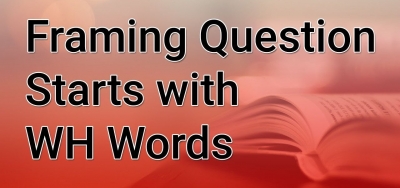
How many questions do you ask on a given day? Do you always get the answers you need? What kinds of questions are successful in getting you answers? It is good to know the trick to ask the right questions in the right way. We ask questions for two main reasons. Can you guess what they are? Yes, to get information (why, what, who, where, when, how) and to confirm a statement (yes or no).
Our first task is to form a sentence that asks a question. “We play football every evening” is not a question. A statement has to be converted into a question (or an interrogative) sentence. To do that, we change the word order.
- We put a question word in the beginning start with what/why/who/which/when/how and complete the sentence. In the end we place a question mark(?). Who is the Prime Minister of India?
- We put a helping verb (is, were, has, have, did) in the beginning, complete the sentence and place a question mark. Have you read the book of Human Bondage?
How can we ask questions?
We can ask questions in different ways, depending on what we want to know. Let’s first see the 5Wh + 1H questions.
5Wh + 1H questions
These are the most common. All quiz programmes have these questions.
Read these examples. (Find the answers!)
- Who was the greatest king of India?
- When was the last time India won a gold medal in the Olympics?
- Where can you find the highest mountain ranges?
- What is the national song popularized by A.R. Rahman?
- Why does the sun rise in the east?
- How do animals in the water breathe?
5Wh +1H questions can be further divided into Interrogative pronouns, Interrogative adjectives and Interrogative adverbs.
- Wh Interrogative pronouns [The question words are pronouns]
- What is your favourite game?
- Which is known as the ‘Manchester of the South? (Coimbatore)
- Whose is this pencil box?
- Who threw rubbish in the classroom?
- Whom do you want to see?
- Wh Interrogative adjectives [The question words are adjectives, followed by the nouns they qualify.]
- Which city is known for mangoes?
- Whose telephone number do you want?
- What language do the Nagas speak?
- Wh Interrogative adverbs [The question words modify verbs.]
- When will you buy me a mobile phone?
- Where were you last night?
- Why did you leave the tap open?
- How did you fix your glasses?
Embedded questions
These questions start with an auxiliary verb and have a noun clause (answers the question What?) starting with a Wh/ H word. The following table will make it clear.
| Auxiliary | Subject | Verb | Object | Noun clause |
| Can | you | tell | me | how it happened? |
| Could | you | please tell | us | where we can find a hotel? |
| Does | she | want | to know | why we went away? |
The noun clause in these sentences is a question. It is embedded in another sentence.
Echo questions
You find these questions in speech alone. Here statements are made to sound like questions by raising the pitch in the voice in the end.
- India has won the match?
- I can eat the cake?
- I can leave the classroom now?
- You fell off the bicycle?
Yes/No Questions
Here the ‘be’ verb or the auxiliary verb begins the sentence.
- Is she your friend?
- Do you drink cola?
- Has the bell gone?
Questions tags
These are short questions added to the end of the sentence to make sure the information is correct or to find out what the listener thinks about something.
Tips:
- If the statement is affirmative, the questions tag is negative. If the statement is negative, the tag is affirmative.
- The tense and the pronoun forms are the same in the statement and the tag.
Picture Credit : Google

